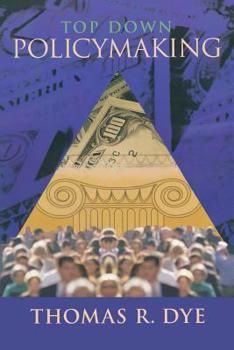Top Down Policymaking
In his eye-opening work, Dye explodes the myth that public policy represents the "demands of the people" and that the making of public policy flows upward from the masses. In reality, Dye argues, public policy in America, as in all nations, reflects the values, interests, and preferences of a governing elite. Top Down Policymaking is a close examination of the process by which the nation's elite goes about the task of making public policy. Focusing...
Format:Paperback
Language:English
ISBN:1889119334
ISBN13:9781889119335
Release Date:September 2000
Publisher:CQ Press
Length:174 Pages
Weight:0.70 lbs.
Dimensions:0.4" x 6.0" x 9.0"
Customer Reviews
1 rating
What and who counts in making national policy
Published by Thriftbooks.com User , 17 years ago
Thomas R. Dye is president of the Lincoln Center for Public Service, a nonprofit and nonpartisan study center at Delray Beach Florida. He is a prolific and well-known author of books on American government and policy. I always go to back covers when browsing paperbacks, because these usually reveal in a nutshell what the book is about. On "Top Down"'s back cover we learn that many of Dye's previous books on politics in America have gone through a large number of editions, e.g. "The Irony of Democracy" (10th ed.) and "Politics in States and Communities" (9th ed), and "Understanding Public Policy" (9th ed). Clearly, Dye's books are established university texts for political science and policy studies. For readers interested in politics but not up on academia's finer points, let me note the difference between political science and policy. PS puts weight on theory and the ideas of authors, i.e. classical and modern analysts of social systems and politics (e.g. Locke, Hume, Marx, Schumpeter, Hayek, Habermas et al). In contrast, policy analysts are more interested in "what is" and "who counts" in terms of political realities. Dye makes it clear that his book is not a recommendation or endorsement of current American politics. It offers analytical models to understand and explain its workings. At the top of the policy formulation processes Dye puts the elites on the boards of heavyweight foundations, think tanks, corporations, labor unions, and other interest groups. Then follow media elites. Often insightful and nuanced, Dye says "the mass media are not always successful in telling people what to think, but they are stunningly successful in telling them what to think about". Dye shows that "whereas elites frequently express disdain for public opinion polls, most Americans(81%)believe that policymakers should pay more attention to them. In short, people realize policy is made from the top down but would prefer more bottom-up policymaking. Much of the book, with authoritative lists of big political spenders, influence brokers, Congressional committees, federal agencies, etc., as well as public polls, seems "hard" and authoritative. As Dye gets into current policies and public programs readers may find different comfort levels depending on their politics. There is a long list of mass preferences that are opposed by current policies: e.g. balanced budget amendment, raising minimum wage, English as official language, life sentences for drug dealers, death penalty for murder, Congressional term limits, etc. I got upset by (but couldn't argue with the validity of) Dye's analysis of why demonstrably bad policies and programs are continued. I give the book 4 instead of 5 stars mainly because I feel that in a field like public policy Dye's hardnosed realism does not leave enough room for subtleties and the idealism that is a unique part of the American tradition. In that sense it loses some of its predictive value - being unable to predict or fit in





